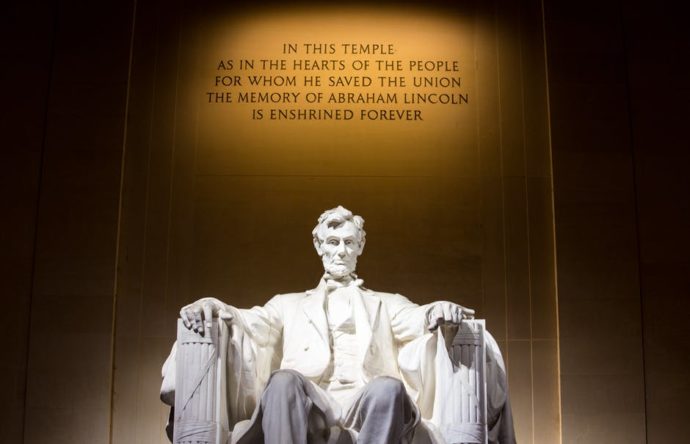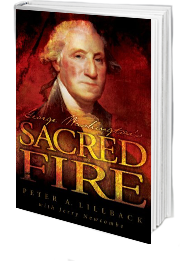Lasting Lessons from Lincoln’s Life and Lips
An acquaintance with the life of Abraham Lincoln, one of America’s greatest leaders, is lacking all too often today. However, insights drawn from his life and words are anything but passé or irrelevant. This can be readily discerned if one considers various facets of his life. Lasting lessons from Lincoln’s life experiences are instructive even in the very different America that we occupy today. Consider twelve insights concerning life from our sixteenth president’s sojourn on earth. These are but a few that I have selected as they have made a fruitful impact on my life.
- Humble beginnings do not mean that someone cannot succeed in life. Lincoln was raised on the frontier. He was born in an open-ended log cabin. He walked four miles each away to his Illinois school. Yet he ultimately walked the corridors of power in Washington D.C.
- An imperfect father can have a great positive impact on his son. Lincoln’s father was a hard-hearted frontier farmer eking out a living. He showed few of the qualities that endear a father to a son. Yet even so, Lincoln’s father’s disdain for the evils of slavery was assimilated by the youthful Lincoln and those same values stayed with him and guided him into his national leadership during the Civil War.
- Self-learning can produce a solid education. Lincoln became a lawyer. His impulse to do was because he unexpectedly discovered a book in a barrel. When he looked at it, he realized it was one of the volumes of Blackstone’s Commentaries on the Law. He began to read it which prompted him to continue studying law. His self-learning of the law laid the foundation of a career that brought him to the bar, to politics and to the Presidency.
- Persevering through depression is worth the struggle. As a young man, Lincoln suffered with depression and even wrote a poem that still exists that reveals that he contemplated suicide. His struggle to live through his emotional suffering enabled him to survive the deep agonies of the war years as well as the loss of his son, preserving the life of the nation in the process.
- Success is often the result of not giving up amid repeated failure. Lincoln only won one election as a US Congressman until he was elected President. He lost his way to success, losing as a Congressman, losing as a Senate candidate until he was finally elected President.
- Faith provides a place to rest in the burdens of sorrow and stress. Even though Lincoln for much of his life was a skeptic regarding religion, as President, he found that the weight of the Presidency was so great that he decided to attend a Washington Presbyterian Church. He was seated quietly out of sight in an adjoining room so he could hear the sermon. It is evident that he began to read the Bible as he quoted it so effectively in his speeches.
- Words are powerful so use them well. Lincoln wrote his own speeches and showed great mastery of the English language. His few words spoken at Gettysburg were only minutes long compared to the hour-long message of the keynote speaker, but it’s Lincoln’s address that lives on to this day.
- The golden rule is a guide for corporate ethics as well as for personal ethics. The teaching of Jesus “to do unto others as you would have them do unto you” was a key argument in Lincoln’s critique of slavery. He asserted that it was fine for any man to have a slave provided that first he himself was willing to be a slave.
- A man’s character is tested more by power than by adversity. One of Lincoln’s classic maxims declares, “Most men can withstand adversity. If you want to test a man’s character, give him power.” Lincoln used his awesome war-time powers to preserve the union and then to seek to heal its wounds.
- Self-deprecating humor is good for the soul. Lincoln was conscious of his ungainly height which prompted him to make humorous comments about the height of people. He once was asked how tall a person should be. He answered, “Tall enough for their feet to touch the ground.” He observed, “God must love short people—he made so many of them.”
- The Bible is a source for moral clarity. Lincoln utilized the Bible as a source for his ideas. He quoted Jesus in his famous address, “A House Divided Against Itself Cannot Stand”. He does so again in the Gettysburg address where he quotes John 3—“a new birth of freedom” and “shall not perish from the earth”. In his Second Inaugural Address he directly refers to reading the Bible, quotes the Scriptures and refers to the providence of God: “Both read the same Bible and pray to the same God, …but let us judge not, that we be not judged. … The Almighty has His own purposes. “Woe unto the world because of offenses; for it must needs be that offenses come, but woe to that man by whom the offense cometh.” … shall we discern therein any departure from those divine attributes which the believers in a living God always ascribe to Him?”
- The greatest enemy of a free nation is suicide. As a young man, Lincoln made a remarkable statement on America’s strength as a free nation. He wrote, “From whence shall we expect the approach of danger? Shall some trans-Atlantic military giant step the earth and crush us at a blow? Never. All the armies of Europe and Asia…could not by force take a drink from the Ohio River or make a track on the Blue Ridge in the trial of a thousand years. No, if destruction be our lot we must ourselves be its author and finisher. As a nation of free men we will live forever or die by suicide.” These words proved to be prescient as the United States nearly killed herself in the Civil War. Will we destroy America by the abuse of our liberty and through incessant political disagreements?
Lincoln did not live his life intentionally to provide an example for others. But his life and leadership have proven to be fascinating models. When the great emancipator of the slaves and preserver of the Union was pronounced dead after his tragic assassination, Edwin M. Stanton, Lincoln’s Secretary of War declared, “Now he belongs to the ages.” Indeed, Lincoln has been embraced through the ages. His unique role in history, remarkable leadership and exceptional rhetorical capabilities draw us to the study of his life.
A final thought: In our current age of divisiveness and turmoil, we do well to remember Lincolns most endearing characteristic, humility. Given the struggles we face, we would do well to consider Lincoln’s self-disclosure: “I have often been driven to my knees to pray with the conviction that I had no place else to go.” This may be the most lasting and liberating lesson for life that we can learn from the lips of Lincoln.

